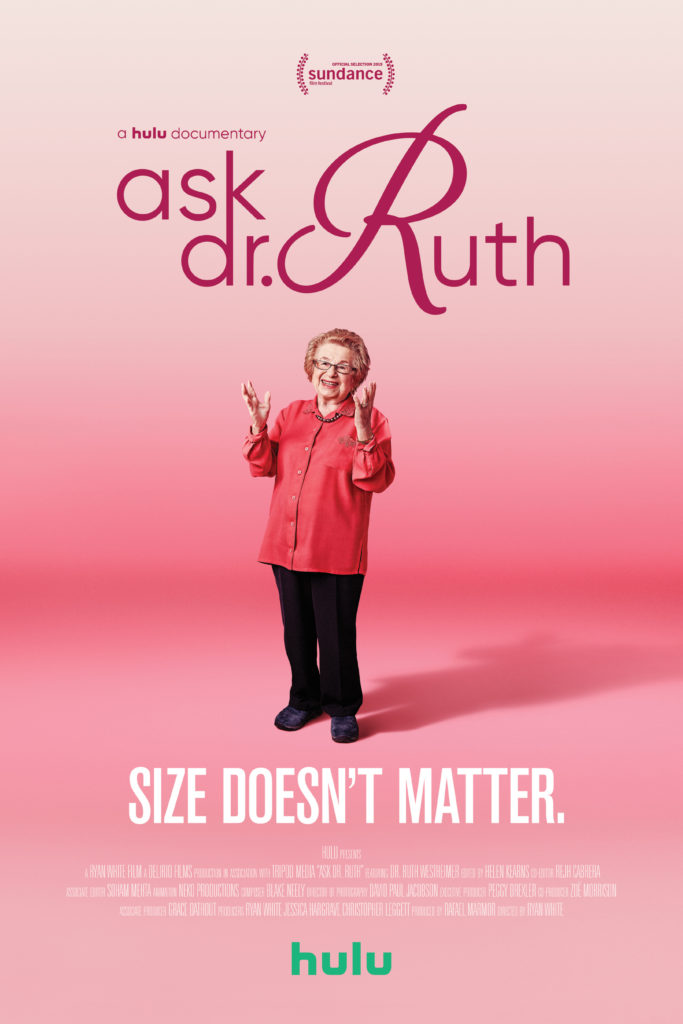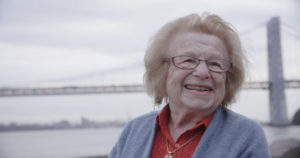by September Williams, MD
ASK DR. RUTH by director Ryan White shows the personal lifestyle of the 90-year-old sex therapist, Dr. Ruth Westheimer. That lifestyle is simple—work, family, home, friends, and the familiarity of happy spaces. It’s a life most people, particularly elders, want to enjoy. White’s film intertwines that norm with the doctor’s unfathomably complex personal, professional and psychological underpinnings. At a height of 4 foot 7 inches, hormones and the assaultive stresses of world history have denied Dr. Ruth a body size reflecting her true stature. What Dr. Ruth lacks in height is more than compensated by a giant intellect and humanitarian zeal.

Six months before I ever saw the famous Centers for Disease Control and Prevention report hailing the beginning of what would soon be called the AIDS epidemic, I heard Dr. Ruth Westheimer’s unique voice over the radio, foreshadowing a dangerous future. I knew about it already, having lost a friend who was among the index cases. Dr. Ruth talked about a new deadly, maybe sexually-transmitted, blood-borne disease on her radio show, Sexually Speaking (WYNY-FM, New York) that I could sometimes hear at medical school in Omaha, Nebraska when atmospheric conditions were just right. Dr. Ruth’s message was a clarion call for more research, compassion and care for the victims of this mysterious illness. Until then, I had never heard a direct command on any FCC-controlled airway to “use condoms,” never mind the implication that such use is an act of love in itself.
Seeing Ryan White’s ASK DR. RUTH clarified for me why this particular sex therapist might have chosen to take the ethically dicey move of ‘outing’ AIDS prior to the CDCdeclaring the epidemic. Buried somewhere between beneficence and justice is always the protection of innocent parties. White’s film helped me understand how Dr. Ruth might be among the best equipped to recognize the difference between moral ambiguities and moral imperatives.
As important as the historical backdrop of Dr. Ruth’s career as a sex therapist, her story is also the tale of a woman who is now in the ‘Old, Old’ phase of life. Aging may be even more universal than sex itself since it starts from the moment of birth, and on Ruth it looks darn good. Throughout the film, the director depicts the doctor gathering and summarizing information that helps her make sense of her life. She’s a therapist by training and nature, and hard-wired for the task.
Born Karola Ruth Siegel, she became Dr. Westheimer after marrying her dearly beloved late husband, Fred. Ruth is a tightly packed powerhouse of a woman, who throughout ASK DR. RUTH is often depicted giggling. In one scene, our hero asks Amazon’s Alexa,’“Who is Dr. Ruth Westheimer?”. Alexa responds straight from Wikipedia,”Ruth Westheimer (born June 4, 1928), better known as Dr. Ruth, is a German-American sex therapist, media personality, and author…”
The simplicity of the response also makes Ruth giggle. This is most likely because the doctor is more inclined to state what she is not,than what she is.Ruth claims that she is not ‘a feminist’ and that she is not ‘political’. She is not ‘a person who will ever touch a gun again’—despite having been a trained sniper by the predecessor of the Israeli Defense Forces in British Mandated Palestine. Dr. Ruth explains that she is not a “Holocaust Survivor”. She believes calling herself such demeans those who died or lived through unspeakable horrors of Auschwitzand other venues of atrocities.
The language that Ruth uses to identify herself (in any of her four languages) is “Holocaust Orphan.” In her life she has been a mother, a grandmother, a sex therapist, author, educator, and friend. Trained in psychology, sociology and holding an Ed.D., Dr. Ruth’s light bubbly nature does not hide the precision of her choice of words.

The film takes the viewer on a tour of the most sustaining places of her life. White allows the protagonist to guide the camera in the present tense. Dr. Ruth’s youth is depicted through animation—the go-to approach of the current documentary film era. Though memoirs are generally as much an invention of memory as truth, this film had great luck: Ruth was always a writer, one who kept and held onto journals . Those writings and a handful of photograph were used to create the animated sequences in ASK DR. RUTH.
The process of creating a film is as important as is the final product. Good filmmakers, crew and stars blend to make more than something to be seen on the screen. White’s ASKS DR RUTH comes from a place that is weary of just documenting despair, opting to show how one triumphs over it. Dr. Ruth’s story is not exactly a Horatio Alger tale. Under her own steam and given a chance to not die in the Holocaust, she became a single working mother and student. Late in her life she found the strength to face the specific documentation of the murders of her parents during the Holocaust, a task she had previously avoided for most of her adulthood.
ASK DR. RUTH helps us makes sense of the remarkable resilience of Karola Ruth Siegel—a girl who was given refuge during the Holocaust. There are other unaccompanied children like Karola sitting on borders around the world and in the country of this writing. ASK DR. RUTH is a gift from Ryan White to us. But what do you think Karola wants from us? I would bet it is the chance for other children to live long lives dedicated to acts of love.
FOR MORE on Ask Dr. Ruth go to Information and Screening HERE